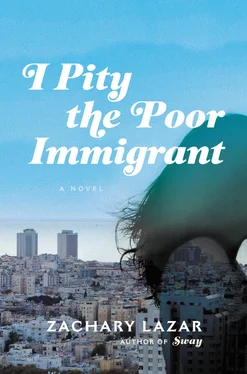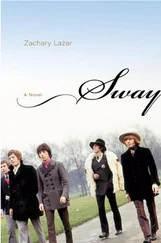His wife had been in a restaurant nine months ago when she’d gone into a seizure and fallen out of her chair. That was how all this had started — the babysitting for someone who didn’t really need a babysitter, the twelve-year-old girl whose mother was in and out of the hospital until one night she wasn’t. On one of those nights when Gila was alone with the terrified girl, the TV lights flashing on the walls of her bedroom, Hannah curled on the floor with a quilted blanket, not crying but frustrated, angry, Gila had told her the story of the camps and the nettle soup. You had to be strong in the face of enormous sadness. That was the simple point of the story. But perhaps the point was simply overwhelming. She had never had children of her own. Perhaps it was no wonder if she did all the wrong things with Hannah.
The house was on a large pond north of the village, a mile from the bay, two and a half miles from the ocean. It had sat empty all that spring and all that summer, even when there was no longer any reason to remain away, even after Groff’s wife, Mona, had died. The headlights shone on the front windows where the roses had sprawled in thin, mad tentacles. When Groff switched on the porch lights, the moths came fluttering around. He’d asked Gila to come along on this first trip because he couldn’t face it, he said. He said he’d talked to Hannah about it and Hannah wanted her to come too. He was frequently candid in this way, in short bursts. It wasn’t that he spoke the language of charm, it was that he somehow embodied charm in all its subtle confusion. His ugliness was charming. His silence was charming. His apparent repudiation of all things charming was part of his charm.
Hannah went up to her bedroom and Groff went back to town to get some dinner, so Gila set the table. The kitchen smelled intoxicatingly of mold. Wood everywhere — varnished floors and exposed beams on the ceiling and the wood of the staircase, the dark frames of the windows. She saw his wife’s taste in dishes — festive bright plates, yellow or orange. Dingy, cheap silverware, amber-colored glasses. The moldy scent and the scent of lemon floor wax gave Gila a feeling not unlike déjà vu, only there were no memories attached to it. Dried flowers in a vase. A kind of potent nostalgia for a place she’d never been, a home she’d never had.

There was an old poster on the wall of Hannah’s bedroom — she’d forgotten it until she went in, planning to call her friend, but when she saw it she put on her Walkman and sat on the bed, hunched there in her salvaged clothes, her father’s baggy dress shirt. There was the small black-and-white TV, the Woody Woodpecker doll, the pink-and-blue desk with its matching chair. There was her mother’s eager, ironic smile looking down on it all, all those toys and games she had bought for Hannah, both laughing at them and with them, as if she’d had a hand in inventing them herself. The poster on the wall showed a disco group in an exuberant Broadway tableau above a set of piano keys that matched the starry midnight sky behind them. The word “camp” had more than one meaning, Hannah’s mother had explained once, one of those meanings being “playful”—the poster and the disco group it portrayed were very “camp,” her mother had said. Hannah listened to the song on her Walkman and saw a blue-and-green swirl like the ocean viewed from a distant height. A new kind of song, mechanistic and cold, the drum machine’s synthetic hand claps coming with such concussive force that they seemed to assert a kind of meaning, like code from some other, more allusive world.
Mr. Stone, the older Hebrew teacher, was always giving his condolences about her mother, and he would sometimes ask her about Gila too. He was a sullen man with an old-fashioned Bronx accent and synthetic dress slacks, age spots on his hands. He knew the whole story — the babysitting last spring during the hospital stays, then her mother’s death. It’s not that bad, Hannah had wanted to say. But of course that isn’t what she’d said. Her contempt for Stone was not pure, it was laced with awkwardness. What she’d said was: Did Gila ever tell you about the camps?
You told my story to Robby Karsh. I thought you understood why I told you that story.
It was such a strange, impersonal accusation, to think Hannah would have told that story to a boy like Robby Karsh, to any of those boys. It meant that Gila didn’t know anything about her, that she understood Hannah as nothing more than another student in that lifeless, spoiled class. The accusation had surprised her so much she hadn’t even been able to deny it. But maybe she wasn’t so different from the other students after all. Why else had she told the story to Mr. Stone? Out of awkwardness. Out of embarrassment. She had told the story to Mr. Stone just to make him stop talking.
As for Robby Karsh, he had no idea about Gila. He’d just drawn the swastika as a joke.

Pizza in the white box, the salad already wilting in its foil tray. The room was too quiet so Groff put on the radio. The receiver glowed an efficient yellow beneath the dial, the nearby college station playing jazz.
“I have to go out a little later,” he said.
Hannah looked up from her plate. Groff turned his hand palm up.
“You have a big date?” Hannah said.
“That isn’t funny.”
“If you’re just going to the Kleins’, why can’t I come?”
“It’s late. It’s already late.”
Gila was hardly listening. She was thinking things through. For example, neither Groff nor Hannah knew she had quit her job at the temple that afternoon. She thought of Hannah’s face in the classroom — that poise, older than Hannah’s age — and wondered how much Hannah suspected.
Groff looked at her, his eyes seeing her but also denying everything about her that wasn’t relevant to this particular moment. “I won’t be long,” he said. “There’s a movie player — Hannah can show you how it works. I don’t know what there is — old tennis matches — Wimbledon. You won’t want to watch that, but there are movies. Hannah will show you.”
He bit into the crust of his pizza, hungrily chewing. The way he ate was so unself-conscious that the room became calmer.

A desk, a bed, a mat on the floor, a dresser with broken handles so that she left the drawers partly opened — this was how Gila lived in Manhattan now. Outside, the city withered, food wrappers and empty cans in an abandoned station wagon, the local shop displaying soap and toothpaste. Her building belonged to a congregant at the temple, that was why the rent was low. She could hear other people’s TVs in the airshaft as she tried to sleep. At first, she’d felt obliged to go to services, sitting there before the cantor’s modal gloom, the loud seconding of the organ, Rabbi Lehman circulating the undressed Torah to the nearly empty pews. They treated her like some sort of wraith, someone foreign to have opinions about.
Not long after he’d hired her, Groff had given her a gift from his shop that hung on the wall of her apartment now, a framed poster from the 1930s, the glass cloudy, the image a hazy black and white. At the bottom was the name Elsa Schiaparelli, the designer, who was posed in profile, her hands clasped casually over the arm of a gilt chair, black hair knotted at one side, a white gown falling off one shoulder in a cowl of fabric cut like feathers. At the top, in pink letters, was the single word Shocking! She had mentioned to him once that she’d wanted to be a designer. He’d remembered.
Читать дальше













